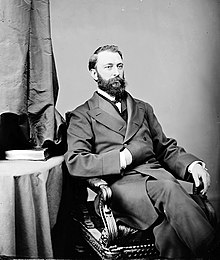William F Prosser
| William Farrand Prosser | |
|---|---|
 |
|
| Member of the U.S. House of Representatives from Tennessee's 5th district |
|
|
In office March 4, 1869 – March 3, 1871 |
|
| Preceded by | John Trimble |
| Succeeded by | Edward Isaac Golladay |
| Member of the Tennessee House of Representatives | |
|
In office 1867-1869 |
|
| Personal details | |
| Born |
March 16, 1834 Williamsport, Pennsylvania |
| Died | September 23, 1911 (aged 77) Seattle, Washington) |
| Political party | Republican |
| Spouse(s) | Flora Thornton Prosser |
| Children | William Thornton Prosser Margaret Prosser Mildred Prosser |
| Profession | teacher, miner, soldier, farmer, publisher, politician |
| Religion | Episcopal |
William Farrand Prosser (March 16, 1834 – September 23, 1911) was an American politician who served in the United States House of Representatives representing Tennessee, and was a Union Colonel in the American Civil War.
Prosser was born on March 16, 1834 in Williamsport, Pennsylvania, the son of David and Rachel Williams Prosser, Welsh immigrants. His family moved to Johnstown, Pennsylvania when he was very young. In Johnstown, he received a limited formal education, but went on to teach school and study law although he never practiced. He moved to California in 1854, where he engaged in mining.
Prosser returned to Pennsylvania in 1861 upon the outbreak of the Civil War to enter the Union Army. He was promoted through the ranks to Colonel, and served throughout the war. Prosser saw action in many battles, including the Battle of Shiloh, the Battle of Stones River, and the Siege of Knoxville. Prosser was briefly a prisoner of war in 1862.
After the war Prosser settled on a farm near Nashville, Tennessee, where he was elected to the Tennessee House of Representatives, 1867–1869. He was elected as a Republican to the Forty-first United States Congress in 1869, and served from March 4, 1869 to March 3, 1871. He was postmaster of Nashville 1872–1875 and a director of the Tennessee, Edgefield & Kentucky Railroad. Prosser was appointed in 1872 as one of the State commissioners to the Centennial Exposition at Philadelphia and was sent on a special mission in 1873 to assist in arranging participation of European countries in the exposition. He published the Nashville Republican for several years.
...
Wikipedia
